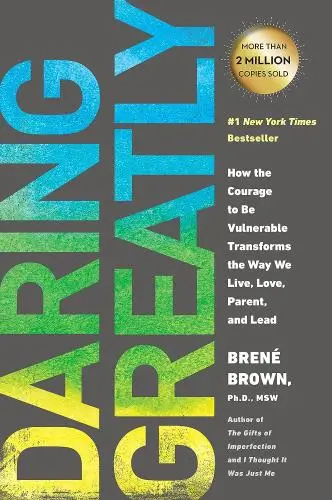
Daring Greatly
How the Courage to Be Vulnerable Transforms the Way We Live, Love, Parent, and Lead
What's it about?
Daring Greatly by Brené Brown is a powerful exploration of vulnerability and courage. Brown challenges the belief that vulnerability is a weakness and instead argues that it is the birthplace of innovation, creativity, and change. She provides actionable advice on how to embrace vulnerability, develop resilience, and cultivate wholehearted living. This book will inspire you to embrace vulnerability, take risks, and live authentically.
About the Author
Brené Brown, known for her insightful and relatable books like "Daring Greatly" and "The Gifts of Imperfection," delves into vulnerability, shame, and resilience. With a warm, conversational style, she weaves personal anecdotes and research to explore the human experience. Her work fosters courage, self-compassion, and embracing imperfections, making her a beacon of wisdom for those seeking authenticity and connection.
10 Key Ideas of Daring Greatly
Embrace Vulnerability
View vulnerability not as a weakness but as a strength.
It's the birthplace of love, belonging, joy, courage, empathy, and creativity.
By embracing our vulnerabilities, we open ourselves up to deeper connections with others and a fuller experience of life.
It requires courage to face our fears and uncertainties, but it's essential for growth and transformation.
Learn DeeperStart a Vulnerability Journal: Each day, jot down moments when you felt vulnerable. Reflect on these moments, noting how they made you feel and what outcomes they led to. This practice can help you become more comfortable with vulnerability over time.
Practice Saying 'I Don't Know' or 'I Need Help': In situations where you might usually pretend to have all the answers, try being honest about not knowing something or needing assistance. This small step can significantly impact how you embrace vulnerability in everyday interactions.
Share Your Feelings with Someone You Trust: Begin by sharing small insecurities or fears with a close friend or family member. As you grow more comfortable, gradually share more significant vulnerabilities. This builds trust and deepens connections.
Set Boundaries for Safe Vulnerability: Understand that being vulnerable doesn't mean oversharing with everyone. Identify safe spaces and people where expressing vulnerability feels supportive and constructive.
- Example
During a team meeting at work, instead of pretending to understand a complex topic, you say, 'I'm not familiar with this. Can someone explain it to me?' This not only shows vulnerability but also opens up an opportunity for learning and collaboration.
- Example
In a conversation with a friend about a recent breakup, instead of putting on a brave face, you openly express your sadness and fears about the future. This moment of vulnerability strengthens your bond and allows your friend to offer genuine support and empathy.
Practice Self-Compassion
Be kind and understanding towards yourself, especially in moments of failure or when confronting personal shortcomings.
Self-compassion involves recognizing that suffering and personal inadequacy are part of the shared human experience.
Treating yourself with the same kindness you would offer to a friend boosts resilience and well-being.
Learn DeeperIdentify Negative Self-Talk: Start by noticing when you're being hard on yourself. Are there specific situations where you tend to be more critical? Acknowledge these moments and actively challenge these thoughts.
Practice Mindfulness: Engage in mindfulness exercises like deep breathing or meditation. This can help you stay present and reduce the impact of negative emotions.
Write a Self-Compassion Letter: When you're feeling down, write a letter to yourself from the perspective of a kind, understanding friend. What would they say to you in this situation?
Set Realistic Expectations: Remind yourself that perfection is unattainable and that making mistakes is part of being human. Adjust your expectations accordingly.
Celebrate Small Wins: Recognize and celebrate your achievements, no matter how small. This can help build a more positive self-view over time.
- Example
After making a mistake at work, instead of spiraling into self-criticism, take a moment to breathe deeply and remind yourself that everyone makes mistakes. Consider what you can learn from this experience.
- Example
When feeling inadequate compared to others on social media, write a self-compassion letter addressing these feelings. Highlight your strengths and remind yourself that social media often portrays an idealized version of life.
Cultivate Authenticity
Live your life as your true self, rather than conforming to the expectations of others.
Authenticity requires letting go of who we think we're supposed to be and embracing who we actually are.
This means making choices based on what you believe, not what others believe, and owning your story.
Learn DeeperReflect on Your Values: Spend some time thinking about what truly matters to you, not what you've been told should matter. Write these down and refer back to them when making decisions.
Practice Saying No: Start small by declining invitations or requests that don't align with your values or that you don't have the capacity for. This helps build the muscle of making choices based on your authentic self.
Seek Feedback from Trusted Sources: Surround yourself with people who know and love the real you. Ask them for honest feedback about when you seem most 'yourself' and use this as a guide to identify when you're being authentic.
Mindfulness and Self-Compassion: Incorporate mindfulness practices into your daily routine to stay present and connected with your feelings and desires. Be kind to yourself when you notice you're slipping into inauthentic behaviors, recognizing it's a journey.
- Example
If you're passionate about environmental conservation but work in a job that conflicts with this value, seeking employment in a field more aligned with your beliefs is an example of living authentically.
- Example
Choosing to spend your free time engaging in hobbies or activities that genuinely interest you, rather than those you think will make you appear more interesting or successful to others, is another way to practice authenticity.
Foster a Resilient Spirit
Develop the ability to bounce back from adversity.
Resilience is built through experiences of failure and learning how to rise after falling.
It involves cultivating hope, practicing critical thinking, and maintaining a perspective that allows for setbacks to be seen as temporary and surmountable challenges.
Learn DeeperEmbrace Failure as a Learning Opportunity: Instead of viewing failure as a negative endpoint, see it as a chance to grow. After a setback, take time to reflect on what happened and identify lessons learned. This mindset shift can transform your approach to challenges.
Cultivate Hope by Setting Realistic Goals: Start by setting small, achievable goals that lead towards a larger objective. Achieving these smaller goals can boost your confidence and reinforce the belief that you can overcome obstacles.
Practice Critical Thinking: When faced with a problem, break it down into smaller, manageable parts. Ask yourself what you can control, what potential solutions exist, and what steps you can take next. This approach can help you navigate through difficulties more effectively.
Maintain a Positive Perspective: Remind yourself that setbacks are temporary and part of the learning process. Surround yourself with positive influences—people who uplift you and literature or media that inspire resilience.
- Example
After losing a job, instead of spiraling into negativity, one might take the opportunity to assess their career goals, update their resume, and explore new industries or roles that align more closely with their passions and skills.
- Example
A student who fails an important exam could use the experience to develop better study habits, seek additional help from teachers or tutors, and approach future exams with a more strategic and informed study plan.
Nurture Connection
Invest time and energy into building deep, meaningful relationships.
Connection is why we're here; it gives purpose and meaning to our lives.
True connection requires vulnerability—letting ourselves be seen and known for who we truly are.
Listen with the same passion with which you want to be heard.
Learn DeeperInitiate Honest Conversations: Start by sharing your feelings and experiences openly with friends or family members. This could be about how your day went, a personal struggle, or your aspirations. The key is to be genuine and open.
Practice Active Listening: When someone is speaking to you, focus entirely on what they're saying. Avoid the urge to formulate your response while they're still talking. Nod, make eye contact, and ask follow-up questions to show you're engaged.
Create a Safe Space for Vulnerability: Encourage an environment where friends and family feel comfortable sharing their true selves. This means not judging, laughing at, or dismissing their feelings and thoughts.
Schedule Regular Check-ins: With busy lives, it's easy to let relationships slide. Make a point to schedule regular catch-ups with important people in your life, whether it's a weekly phone call or a monthly coffee date.
Express Gratitude and Appreciation: Let people know you value them. A simple 'thank you' for their presence in your life can strengthen your connection.
- Example
During a dinner with a close friend, instead of discussing general topics, you choose to share a recent challenge you faced at work and how it made you feel. This opens up a deeper conversation where both of you share and listen to each other's vulnerabilities.
- Example
At a family gathering, instead of sticking to small talk, you ask your sibling how they truly are coping with their recent life changes. You listen attentively, offer support, and share your own experiences, creating a stronger bond through mutual understanding and support.
Deeper knowledge. Personal growth. Unlocked.
Unlock this book's key ideas and 15M+ more. Learn with quick, impactful summaries.
Read Full SummarySign up and read for free!
Daring Greatly Summary: Common Questions
Experience Personalized Book Summaries, Today!
Discover a new way to gain knowledge, and save time.
Sign up for our 7-day trial now.
No Credit Card Needed

Similar Books

The Hobbit
J.R.R. Tolkien
Fichte
Johann Gottlieb Fichte
English Spirituality
Gordon Mursell
Serpent Rising: The Kundalini Compendium
Neven Paar
Feeling Is the Secret
Neville Goddard
How to Read the Akashic Records
Linda Howe
I Who Have Never Known Men
Jacqueline Harpman
Key Approaches to Biblical Ethics
Rabens, Volker
Macbeth
William Shakespeare
Hamlet
ShakespeareTrending Summaries

Peak
Anders Ericsson
Never Split the Difference
Chris Voss
Smart Brevity
Jim VandeHei
The Psychology of Money
Morgan Housel
The First 90 Days
Michael D. Watkins
Atomic Habits
James Clear
Thinking, Fast and Slow
Daniel Kahneman
The Body Keeps the Score
Bessel van der Kolk M.D.
The Power of Regret
Daniel H. Pink
The Compound Effect
Darren HardyNew Books

Forex Trading QuickStart Guide
Troy Noonan
Comprehensive Casebook of Cognitive Therapy
Frank M. Dattilio
The White Night of St. Petersburg
Michel (Prince of Greece)
Demystifying Climate Models
Andrew Gettelman
The Hobbit
J.R.R. Tolkien
The Decision Book
Mikael Krogerus
The Decision Book: 50 Models for Strategic Thinking
Mikael Krogerus
Fichte
Johann Gottlieb Fichte
Do No Harm
Henry Marsh
